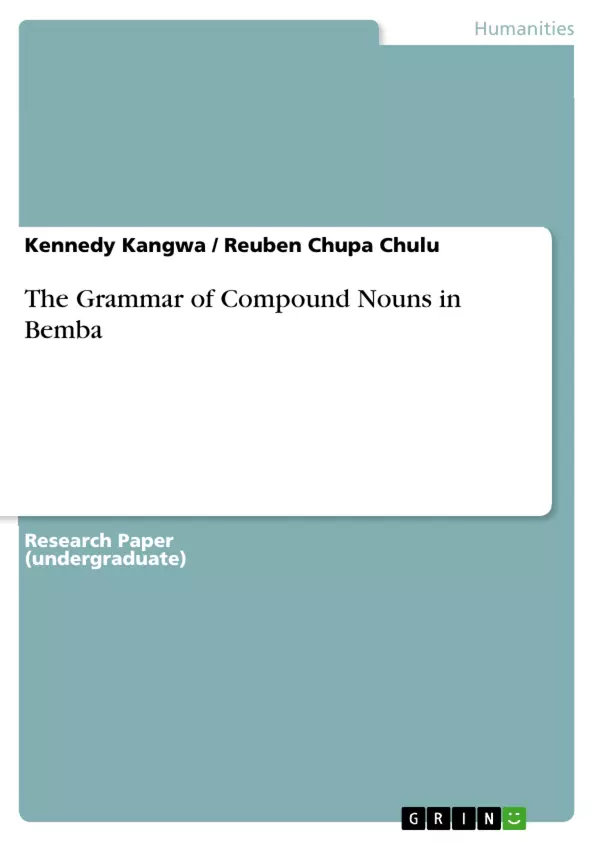This study is informed by the observations and revelations that Bemba compound nouns do alter the meaning of words. At the centre of generating meanings of compound nouns in Bemba is a critical analysis into the grammar of Bemba compound nouns with regard to their morphology, syntax and semantics. The study lends itself to the contention by Kula (2009) that the combined nominal roots show properties of compounds with respect to the head controlling agreement and with respect to prosodic requirements on the head to end in a high tone. According to Guthrie (1969), Bemba, coded (M42), is a Bantu language mainly spoken in the Northern part of Zambia. Bemba compound nouns present an interesting area of Bantu linguistics in the manner the compounds behave with regard to their grammar.
Dr. Kangwa N.K. is a lecturer at Kwame Nkrumah University in Zambia. They are in the department of Literature and Langauges where they have been lecturing for more than ten years.
Table of Contents
- 1.0 Abstract
- 1.1 Overview
- 1.2 Background to the Bemba People and their Language
- 1.2.1 The Bemba People
- 1.2.2 The Bemba Language
- 1.3 Typology of Language
- 1.4 The Classification of African Languages
- 1.5 Compounding as a Word Formation Process
- 1.6 The Syntax of Bemba Compound Nouns
- 1.6.1 Overview
- 1.6.2 Syntactical Structure of Bemba Compound Nouns
- 1.6.3 Some Phrase Structure Rules of Noun Compounds
- 1.7 Phrase Structure Rules
- 1.8 Summary of Syntactic Analysis
- 1.9 Conclusion
Objectives and Key Themes
The study investigates the grammatical properties of Bemba compound nouns, focusing on their morphology, syntax, and semantics. The research employs the unified theories of argument structure, Government and Binding, and Transformational Generative Grammar to analyze the grammatical properties of compound nouns. The study aims to establish how the meaning of individual words is altered when they combine to form compound nouns. Qualitative research methods were used to collect and analyze data from a corpus of Bemba compound nouns.
- The grammatical properties of Bemba compound nouns.
- The relationship between morphology, syntax, and semantics in Bemba compound nouns.
- The impact of compounding on the meaning of individual words.
- The role of unified theories in understanding the grammar of compound nouns.
- The application of qualitative research methods in the study of compound nouns.
Chapter Summaries
- Chapter 1.0 Abstract: This chapter introduces the study's focus on the grammatical properties of Bemba compound nouns, highlighting their significance in understanding the language's morphology, syntax, and semantics. It also mentions the study's reliance on existing theories and its qualitative approach to data collection and analysis.
- Chapter 1.1 Overview: The study's objectives, theoretical framework, and methodology are detailed, outlining its purpose to explore the grammar of Bemba compound nouns using a unified theoretical approach and qualitative research methods.
- Chapter 1.2 Background to the Bemba People and their Language: This chapter provides context by introducing the Bemba people and their language. It describes the Bemba people's cultural practices, including their traditional livelihood, social organization, and language use. It also emphasizes the significance of Bemba as a major language in Zambia.
- Chapter 1.3 Typology of Language: This chapter discusses the concept of language typology, explaining how Bantu languages are classified based on their shared linguistic features. It highlights the agglutinative nature of Bantu languages, specifically Bemba, and how this feature relates to the study of compounding.
- Chapter 1.4 The Classification of African Languages: This chapter provides a broader overview of the classification of African languages, focusing on the Congo-Kordofanian family, which includes Bantu languages. It further discusses the sub-branches of this family, highlighting the Niger-Congo branch to which Bemba belongs.
Keywords
The primary keywords and focus topics of this study include Bemba language, compound nouns, morphology, syntax, semantics, unified theories, argument structure, Government and Binding, Transformational Generative Grammar, qualitative research, agglutinative languages, Bantu languages, and African languages.
- Arbeit zitieren
- Kennedy Kangwa (Autor:in), Reuben Chupa Chulu (Autor:in), 2022, The Grammar of Compound Nouns in Bemba, München, GRIN Verlag, https://www.hausarbeiten.de/document/1242944


